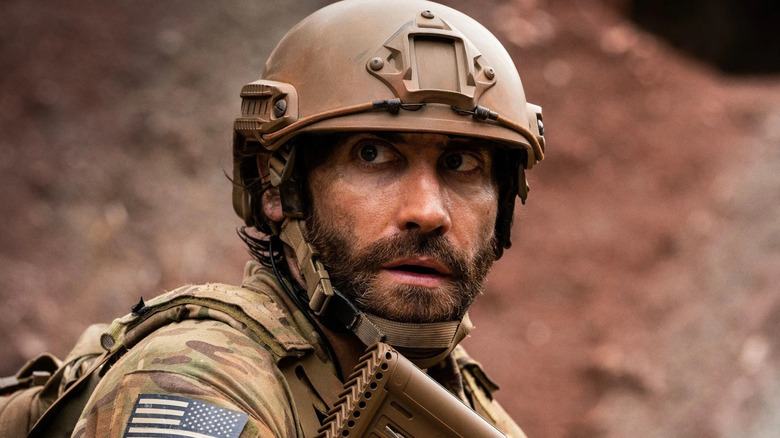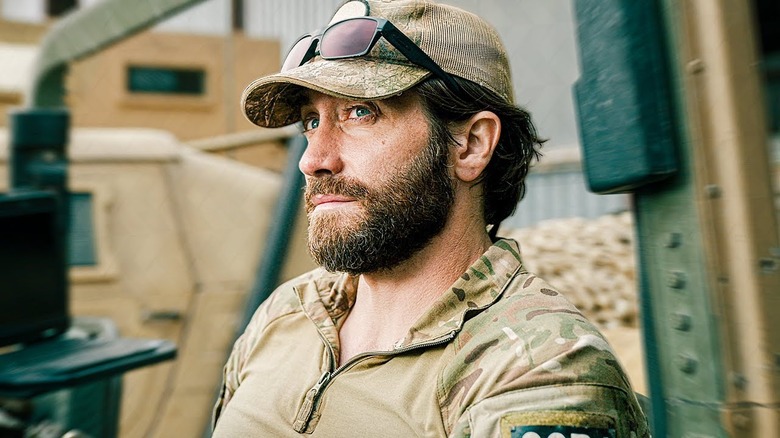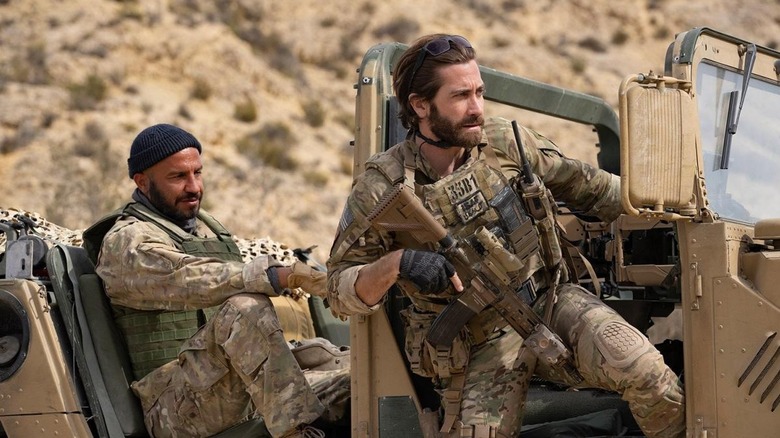Guy Ritchie's The Covenant Isn't Based On A True Story, But It's Not Far Off
In /Film's review of "Guy Ritchie's The Covenant," the critic (yours truly) made passing reference to the fact that the film was based on a real-life story, and stated that army sergeant John Kinley, the role played by Jake Gyllenhaal in the movie, was a real person. This wasn't accurate. While the film was extrapolated from a patchwork of actual events and experiences that happened during the Afghanistan war, it was not a direct biography of any one person in particular. As it happens, there is no actual person named John Kinley who fought in Afghanistan. The error has been corrected.
"The Covenant" is about how Kinley was assigned a battle-capable interpreter named Ahmed (Dar Salim) to help him and his platoon locate Taliban bomb-making facilities. During a raid gone awry, Kinley and Ahmed find themselves the only survivors left, trekking deep into Taliban territory. When Kinley is injured, Ahmed drags him over a mountain to safety. Kinley recovers and returns home, only to learn from afar that Ahmed is now being hunted by Taliban soldiers. Kinley returns to Afghanistan to rescue his battlefield compatriot to pay back the favor. There's a lot of violence and not a lot of thought.
Several outlets have pointed out, however, that "The Covenant" falls more into the realm of "generally true" rather than "biographically true." There may be no John Kinley, but there were many, many Afghan interpreters hired by the U.S. Military that were promised exit visas in exchange for their services. A 2021 report by NPR revealed that when the U.S. hastily pulled out of Afghanistan after a 20-year quagmire, many of the interpreters were left in a lurch, their lives in danger.
Attention to an issue
Guy Ritchie is one of the more macho filmmakers currently working and typically tells stories of blokes bonding with other blokes. With "The Covenant," his central interest is depicting a certain kind of soldierly camaraderie as a central driving force of humanity. This is to say, he has no real interest in litigating the politics of the Afghanistan war, its origins, its purpose, or its painfully protracted length. It's unusual that Gyllenhaal should appear in the 2005 film "Jarhead," only to make such a thematically opposed film as this. The former was a deeply cynical film, depicting the soldier's experience as a violent, mind-numbing purgatory. The latter is a rah-rah, pro-military tale of heroism. The two films couldn't be any more different.
Over the course of the last 20 years, it's been interesting to watch Hollywood's ambivalent depiction of the war change. Several focused on the intensity and violence of America's occupation of the Middle East ("The Green Zone," "The Hurt Locker," "A War"), while others occasionally came along to vaunt the soldier's experience and stand out as works of unashamed jingoism ("Act of Valor," "12 Strong," "The Outpost"). It's no wonder that The Avengers, a freelance military force, should have become so popular during an extended, protracted wartime. More and more people were becoming soldiers, and the Avengers were their fantastical avatars.
In terms of its action-forward storytelling and blunt narrative, "The Covenant" falls more into the latter camp than the former. But it does, at the very least, bring up a real issue that the Afghanistan War created.
The continuing problem
A report in the Los Angeles Times in October of 2022 pointed out that some of the interpreters hired by the military weren't just left behind, but were blacklisted entirely. In England, some interpreters were flown out of Afghanistan, only to arrive homeless and without resources. Al Jazeera wrote a damning report about how betrayed Afghani citizens felt over the way the U.S. military abandoned them. It wasn't a new phenomenon, either. According to a report by the Smithsonian Magazine way back in 2016, interpreters were already being dubiously compensated for their services. This was an ongoing crisis of the United States exploiting local workers and being ill-equipped to pay them.
This was not a crisis "The Covenant" had any interest in delving into. It brought up that the Army's inability or unwillingness to help local interpreters was a problem, but it is not critical of the military at all. Indeed, "The Covenant" argues that additional military action might very well be the solution to the problem. There is an extended sequence in "The Covenant" of Kinley on the phone with various bureaucrats, trying to arrange passage for Ahmed and his family, stranded in Afghanistan. Kinley is shut down by long call waits and confusing paperwork. In the world of "The Covenant," the real enemy is bureaucracy.
When the U.S. pulled out of Afghanistan, the Taliban almost immediately seized back power. The war couldn't be won, and its swift, sloppy end was inevitable. It's a pity that it was as messy as anyone could have predicted. Hundreds of interpreters are still there, but supporting organizations like No One Left Behind is a great way to help.


